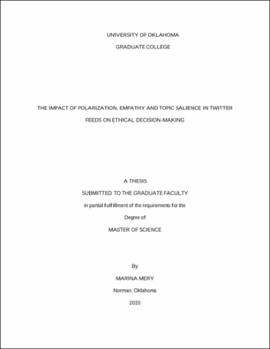| dc.description.abstract | Given the potential reach and influence of social media, this research seeks to explore the causal impact of limited character social media on ethical perceptions and decisions within and outside of social media. These two studies explore whether and how different features of social media exchanges impact moral disengagement, meta-cognitive strategies, ethical sensemaking and ethical decisions. Participants in study one were exposed to differing levels of polarization (low, high) and empathy (low, high) regarding a low salience contentious topic via a Twitter feed, while participants in study two viewed a high salience contentious topic via a Twitter feed in which polarization and empathy were also manipulated. After exposure to the feed, participants were asked how they would respond to the feed and then responded to an ethical decision making (EDM) scenario unrelated to the Twitter feed topics. Low polarization for the low salience topic led to greater use of moral disengagement mechanisms in response to that feed. The high polarization, low empathy feed had the greatest effect on meta-cognitive strategies and overall ethicality for the EDM scenario. Use of moral disengagement mechanisms in the EDM scenario for the low salience topic, on the other hand, was most impacted by the high polarization, high empathy feed. These patterns didn’t hold for the high salience topic, where meta-cognitive strategies in response to the feed were most prominent in the low polarization condition. Moral disengagement in response to the EDM scenario was not impacted by levels of polarization and empathy, and only one aspect of ethical sensemaking showed group differences. Participants responded to the highly salient topic with more transparency, leading to less use of moral disengagement to mask perspective and less meta-cognitive strategies to make sense of a situation that wasn’t ambiguous. | en_US |
